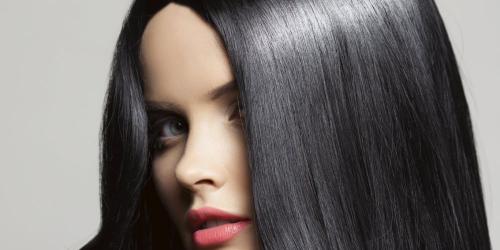Endocrine disruptors , irritants for the scalp, suffocating for the hair fiber, pollutants for the environment ... It is increasingly criticized more and more regularly for sulphated surfactants, parabens and silicones contained in shampoos to threaten our health and the environment.
But how to disentangle the true from the false, and above all, to which alternatives to turn to cosmetics if we apply the precautionary principle?
Surfactants: a washing and foaming function ... irritating
Derived from sulfur, lauric alcohol and petroleum jelly, sulphates are synthetic ingredients that are appreciated for their degreasing and foaming properties . If found in most cleaning products, such as dishwashing liquid or in detergents, they are also included in the composition of cosmetics products, such as shampoo.
According to Didier Thévenin, director of the international Melvita training "sulphated surfactants have the reputation of being irritating . The ECOCERT certified Cosmebio standard prohibits the use of Sodium Lauryl Ether Sulfate, also called Sodium Laureth Sulfate or SLES, for its aggressive and irritating side on the skin ".
However, it is the surfactant used mainly in traditional shampoos, ie not certified organic. The reason ? Its low cost and its great foaming properties, much appreciated by consumers.
"At first glance, you can be conquered by the products that contain them, because you have the impression that they clean the hair deeply." On paper, this is indeed the case, since the SLES is a strong detergent . However, it is a very irritating ionic surfactant, which can weaken the scalp. It can also ultimately damage the hair follicle, which can lead to a weakening of the hair structure, including a depletion of keratin naturally present in the hair - and a slowdown in its growth.
Other sulphated agents are sometimes found in the composition of our shampoos such as Sodium Lauryl Sulfate (SLS), which is also potentially irritating, and Ammonium Lauryl Sulfate ( ALS), which are authorized by the ECOCERT Charter because "less aggressive than SLES, but still not recommended, "says Didier Thevenin.
Avoid if: you have sensitive skin and scalp. We also ignore this ingredient stripper if we have colored hair- they will bleed the color-or if we are adept of permanent smoothing .
The soft alternative? Sugar-derived surfactants such as Decyl Glucoside or Coco-Betaine are preferred, which improves the quality of the foam by also facilitating hair styling. They wash gently and are biodegradable . We also do not forget the surfactants of natural origin such as ultra-mild glutamates: Sodium Cocoyl Glutamate or Disodium Cocoyl Glutamate. Sure, it's less foamy, but it's just as effective.
Silicones for smooth and shiny hair ... only on the surface?
They make the hair shiny, they facilitate the disentangling and styling: the silicones - known under the chemical names ending most often in "-xane", "-ane", "-thicone" or "-thiconol" - were introduced into our shampoos in the 1950s.
True cosmetic feat at the time, they are however not appreciated in the same way today. The reason ? If this polymer - or organic oligomer - is obtained by chemical synthesis of silica (an ore), it is its transformation to the final product that poses a problem, because it adds non-organic substances, non-biodegradable, and therefore polluting for the environment.
However, silicones are full of promise for our hair: they can indeed shrink the hair, smooth the hair fiber, and fill the forks. The substance acts like the natural hydrolipidic film: it limits the external aggressions caused by the thermal shocks, the aggressions related to the limestone and the too energetic brushing of the hair.
Used at high doses and very regularly, silicones are however accused of choking the scalp as well as the hair fiber itself. They can actually slow hair growth , trigger an overproduction of sebum and cause the appearance of dandruff by clogging the pores of the skin.
To avoid if: one has a nature of fine hair, without volume - the silicones will tend to weigh them down - or a tendency to the greasy scalp, that the substance could accentuate.
The soft alternative? Water-miscible silicones are preferred which are more easily removed by rinsing and limit the accumulation of residues in the scalp. Vegetable silicone (obtained by mucilage of a red algae extract), chicory inulin - a complex vegetable sugar - will "shrink the hair as conventional silicones would, in less efficient", still specifies Didier Thevenin.
Good to know : when you decide to switch to shampoo without silicones , the hair tends to be dry and dull in the first month of transition. It is then necessary to think to well hydrate them with vegetable oils during this period of time.
Parabens, preservatives ... harmful for hormonal balance
They do not make the hair more beautiful, but yet they are indeed present in the composition of our shampoos. Parabens, or paraoxybenzoates are a family of preservatives that prevent bacteria or fungi from developing in hygiene products.
Problem, they are suspected to be very bad for health: carcinogens, endocrine disruptors, responsible for a decline in fertility, allergens, potentially toxic to the liver ...
"More and more studies are conducted and lead to the same conclusion: our health is threatened by too frequent exposure to these ingredients. In organic cosmetics, we have preservatives - mostly synthetic - which are added sparingly, often mixed together to provide safety for the consumer, without exaggerated dosage ", explains Didier Thevenin.
To avoid if: one is subject to regular skin allergies or punctual, or simply if one wishes to limit its exposure to these substances by precautionary principle.
The soft alternative? Labels are carefully read and components such as parabens, triclosan , phenoxyethanols and methylisothiazolinone are leaking.
>>> Discover our selection of soft shampoos based on natural and / or organic active ingredients stamped without parabens, without silicones, in our slideshow.




